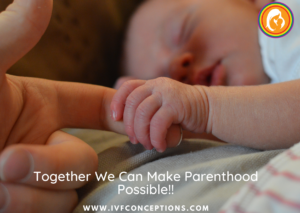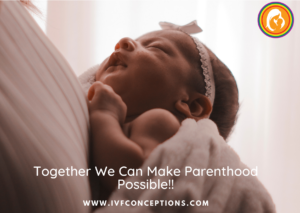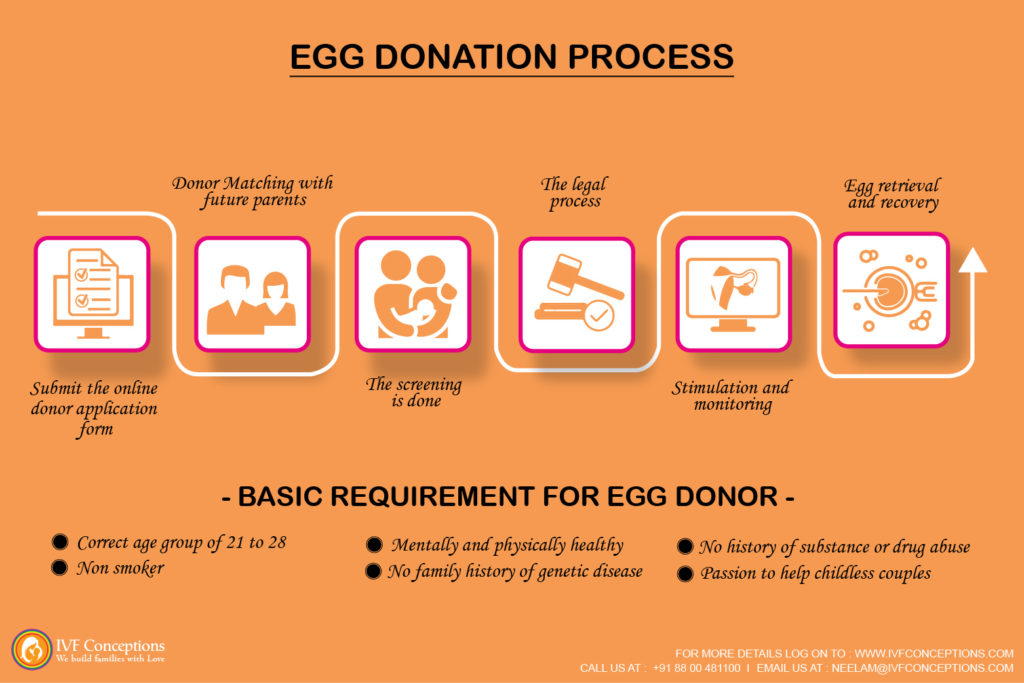What You Need To Know About Egg Donation Requirements

Egg donors are doing a wonderful job all around the world by helping intended parents to start their families. Donation of eggs is an act of selflessness, but an important decision. Every year thousands of women donate their eggs successfully. It may be worth learning more about this if you are considering being an egg donor or looking for an egg donor. Before making such a major life decision it never hurts to be prepared. In this article, we will provide you with detailed information to help you understand the physical, health, geographic, and educational criteria and some facts about egg donation requirements.
Egg donation is a process in which egg donors donate their eggs to needy couples who cannot have their children due to age or diminished fertility in females. Egg donation is also used by gay couples to have their own children.
Moreover, a single male can use the donor eggs to have a child of their own. Generally, it is used by all – homosexual couples, heterosexual couples, and single persons who want to be parents with the help of Assisted Reproductive Technology (ART).
 Egg donation is not an easy process such as sperm donation. Some of the women might feel that they can donate their eggs on the very same day they visit the agencies. But the case is entirely different. You have to undergo various medical examinations before being approved as an egg donor. The egg donor agencies have strict protocols around the donation of eggs or matching the egg donor.
Egg donation is not an easy process such as sperm donation. Some of the women might feel that they can donate their eggs on the very same day they visit the agencies. But the case is entirely different. You have to undergo various medical examinations before being approved as an egg donor. The egg donor agencies have strict protocols around the donation of eggs or matching the egg donor.
Read more:
Top 8 Factors to consider while choosing an egg donor
How does the egg donation process work?
What are the pros and cons of egg donation?
How many eggs have a woman born with?
 How much time does the egg donation procedure take?
How much time does the egg donation procedure take?
It generally takes 2 weeks for the full egg donation process. An egg donor has to take various medications to stimulate the formation of the egg. These medications are given to the egg donor based on her menstrual cycle. This is very important for the successful retrieval of an egg from the donor. Once there are multiple eggs, then the egg donor can donate her eggs via a simple surgical procedure known as egg pickup. These retrieved eggs are then fused with the sperm to form an embryo which is then planted in the woman’s uterus.
So, who can be a prospective egg donor?
For the successful retrieval of the eggs, it is important to take care of a few factors before considering a woman as an egg donor. These factors are –
- She should be in the age of between 19 and 28 years.
- Need sound physical and mental health.
- She should have no issues with the menstrual cycle.
- Should be ready to be assessed by the doctors.
- She must not be into smoking and drinking habits.
Physical Requirements for Egg Donors
Being an egg donor requires certain physical attributes to ensure the best outcome for all parties involved. Here are the physical requirements for egg donors:
- Age: To be eligible for egg donation, you must be between the ages of 21 and 29. However, experienced donors may be accepted up to the age of 31. The age criteria are in place to ensure the highest quality and success rate for egg retrieval.
- Body Mass Index (BMI): Your BMI should be lower than 29 to qualify as an egg donor. A higher BMI may affect the response to medications and the overall success of the egg retrieval process.
- Ethnic and Racial Background: We welcome egg donors from all ethnic and racial backgrounds. Diversity in the donor pool helps meet the unique needs of intended parents from various backgrounds.
 Health Requirements for Egg Donors
Health Requirements for Egg Donors
The health of both the donor and the potential child is of utmost importance. To qualify as an egg donor, you must meet the following health requirements:
#1. Family Medical History: Having no more than one occurrence of the same genetic cancer in your family history is essential. However, non-genetic cancers such as leukemia and lung cancer may not disqualify you from becoming a donor. Additionally, a family history with no serious heart disease or heart attacks under the age of 55 is preferable.
#2. Psychiatric Health: A history of psychiatric hospitalizations may affect your eligibility as an egg donor. This requirement ensures the overall well-being of the donor during and after the donation process.
#3. Injections: As an egg donor, you must be comfortable with self-administering daily injections using small needles, similar to those used for insulin. This requirement is necessary to stimulate ovulation and facilitate the egg retrieval process.
Egg Donor Medication Requirements
Egg donors are required to take medications, including injections, to stimulate egg production. Here is what you need to know about egg donor medication requirements:
- Stimulation Medications: Egg donors need to take daily injections to stimulate their ovaries for egg production. The medications typically span around 21 days, although the duration may vary based on the clinic’s protocol and individual response to the medications.
- Trigger Shot: Once your body is ready, you will receive a “trigger shot” injection that triggers ovulation, allowing for the retrieval of mature eggs.
It’s natural to feel some apprehension about the injections involved in the process. However, rest assured that the needles used for blood work and injections are relatively small and typically not as intimidating as they may seem. The injections can be self-administered in the abdomen, upper thigh, or buttocks. It’s essential to remember that the temporary discomfort of the medications is a small part of the incredible gift you are giving to others.
Process of egg donation
Egg donation is not just about the retrieval of the eggs from the egg donor. It is much more than that. It has 5 steps in the procedure –
- Application – Applying as an egg donor is the first step of the egg donation process. Once you are sure about your decision of donating eggs, you can apply to any egg donor agency of your choice. For this purpose, you have to fill out the application form in which you will have to fill in the details about your personal information and your physical health.
- Selection – Once you apply to the agency, they will look after your application and then inform you if you are a suitable candidate. After that, you will have to go for psychological screening and medical examinations. This process generally takes 1 to 2 weeks.
- Matching with the intended parents –You will become one of the licensed donors once your application and selection are completed. You’ll meet a couple after that who would like you to become their donor of egg. If you accept the match, further medical screening and testing will be required. You can do this in a fertility clinic of the preference of the intended parent and provide a summary of all drugs and you have to keep track of the menstrual cycle. You will also have a meeting with an attorney to discuss the legal aspects of your egg Donation during the medical tests and appointments phase.
- Medications – Typically, the entire medication cycle is about four weeks long. The legal paperwork is now ready and more medical screenings have been performed. Before you can start taking the medication, wait till your next menstrual cycle begins.
- Egg retrieval – Egg retrieval is the final stage of the egg donation process. The procedure is generally 30 minutes long. This process will require to administer anesthesia to the egg donor. The doctor uses an ultrasound guide for the retrieval of eggs vaginally. Egg donation actually requires something called “twilight anesthesia” at the end of this process to maintain the patient sedated but not unconscious. A full day of rest followed by a light activity is expected afterward. It takes until the doctor at the fertility clinic says it’s safe to go back to a normal level of activity.
Cost of egg donation
Egg donation pay ranges from $5,000 to $ 10,000, which matches well with the average industry of $8,000 per donation. The recommendations also align with ASRM’s recommendation that a maximum pay-out amount of $10,000 be charged. The precise quantity depends on a range of factors, such as the type of egg donors, previous egg donation history, if the past donation has confirmed pregnancy and demand for the ethnicity of the donor.
In Eastern European counties, the egg donor compensation is much less as compared to the USA. Also, most of the egg donors are ready to travel outside the country for the egg donation process.
What are egg donation Requirements?
Egg donor requirements that a woman needs to fulfill before being enrolled
- The lady has to be between the ages of 21 and 28
- Physically healthy and mentally stable
- She should have regular, monthly menstrual periods
- Have a BMI of 19-29
- Non-Smoker and no drug abuser.
- Not using contraceptive implants or Depo-Provera injections as a form of birth control.
- She needs to have both ovaries
- Psychologically healthy and understand the commitment
- Ready to undergo a medical procedure, with no fear of the needle
- Desire to help a childless couple
Is Egg Donation Painful?
The experience of egg donation varies from woman to woman. Some may find the injections slightly uncomfortable at times, while others may describe them as nothing more than a pinch. It’s important to remember that the egg retrieval procedure, which typically takes 15-25 minutes, is performed under general anesthesia. During this time, you will not feel any discomfort or pain.
The recovery period after the retrieval procedure varies for each individual, but on average, it may take about a week to feel back to normal. Following your doctor’s instructions, getting sufficient rest, and avoiding strenuous activities will help ensure a smooth recovery.
The Benefits of Egg Donation
Choosing to donate your eggs can have a profound impact on those who cannot conceive on their own. By becoming an egg donor, you help both heterosexual and same-sex individuals and couples fulfill their dreams of parenthood. Additionally, the egg donor compensation is given for her time and effort during the egg donation process.
Conclusion
If you want to help infertile couples donating eggs is a wonderful gift. But knowing the pros and cons of egg donation and making a sound decision based on facts and counseling is important.
Do ask as many questions as possible with your egg donation agency, fertility doctor, and legal team so that you are well aware of the process.
If you’d like to learn more about IVF, Egg Donation requirements, or surrogacy services globally, check out the rest of our website: IVF Conceptions. We offer legally secure and affordable surrogacy consulting services for FREE.
FAQs About Egg Donation Requirements:
What are the age requirements for egg donation?
The age requirements for egg donation typically range between 21 and 29 years of age, although some programs may accept experienced donors up to the age of 31. The specific age limits can vary depending on the egg donation program or agency.
What are the health requirements for egg donation?
The health requirements for egg donation include being in good physical and mental health. Donors should have no serious heart disease or heart attacks under the age of 55, no psychiatric hospitalizations, and should be comfortable with self-administering injections using small needles, similar to those used for insulin. These requirements are in place to ensure that the egg donation process can be carried out safely and successfully.
Are there any weight requirements for egg donation?
Yes, there are weight requirements for egg donation. Donors are typically required to have a Body Mass Index (BMI) lower than 29. This criterion helps ensure that donors are within a healthy weight range and reduces potential risks during the egg donation process.
Can I donate eggs if I have a family history of genetic disorders?
Generally, individuals with a family history of inheritable genetic diseases may not qualify for egg donation. This requirement is in place to minimize the risk of passing on genetic disorders to the intended parents or future children. However, specific guidelines may vary among different egg donation programs or agencies, so it’s essential to consult with the specific program or agency for detailed information regarding family history and genetic disorders.
How long does the egg donation process take?
The duration of the egg donation process can vary, but it typically takes several weeks to a few months from the initial screening to the completion of the egg retrieval procedure. The process involves various stages, such as application, screening, matching with intended parents, medical and psychological evaluations, synchronization with the recipient’s menstrual cycle, and the actual egg retrieval. The timeline may be influenced by factors such as the availability of suitable matches and the individual’s response to medication protocols.
Are there any financial requirements for egg donation?
The specific financial requirements for egg donation can vary among different programs or agencies. It is advisable to consult with the specific program or agency to understand the financial aspects associated with egg donation, including compensation, reimbursements, and any related expenses. Egg donors may receive compensation for their time, effort, and any potential discomfort or inconvenience experienced during the process. However, the compensation structure can vary, so it’s important to clarify this aspect with the respective program or agency.[[
What tests are involved in the egg donation screening process?
The egg donation screening process typically includes various tests and evaluations. These can include medical and genetic testing, infectious disease screening, hormonal evaluations, and psychological evaluations. The purpose of these screenings is to ensure the donor’s physical and mental well-being, as well as to assess the suitability and quality of the donated eggs. The specific tests may vary depending on the program or agency conducting the screening.
Is there a limit to the number of times I can donate eggs?
The number of times an individual can donate eggs may vary depending on various factors, including the guidelines of the specific egg donation program or agency, the donor’s health, and previous donation experiences. Some programs may have restrictions on the number of times a donor can participate, while others may allow multiple donations within certain guidelines. It’s important to consult with the program or agency for specific information regarding donation limits and guidelines.
Can I donate eggs if I’m on birth control?
The eligibility criteria for egg donation may vary depending on the program or agency. Some programs may require donors to be off hormonal birth control for a certain period before starting the donation process, while others may have different guidelines. It’s recommended to consult with the specific program or agency to understand their requirements and guidelines regarding birth control use and egg donation.
Are there any psychological requirements for egg donation?
Psychological evaluations are often part of the egg donation screening process. These evaluations aim to assess the donor’s psychological well-being, emotional readiness, and understanding of the potential psychological implications of egg donation. The purpose is to ensure that the donor is mentally prepared for the process and can provide informed consent. The specific psychological requirements and assessments may vary among different programs or agencies.
Reference Used:

 How much time does the egg donation procedure take?
How much time does the egg donation procedure take? Health Requirements for Egg Donors
Health Requirements for Egg Donors


